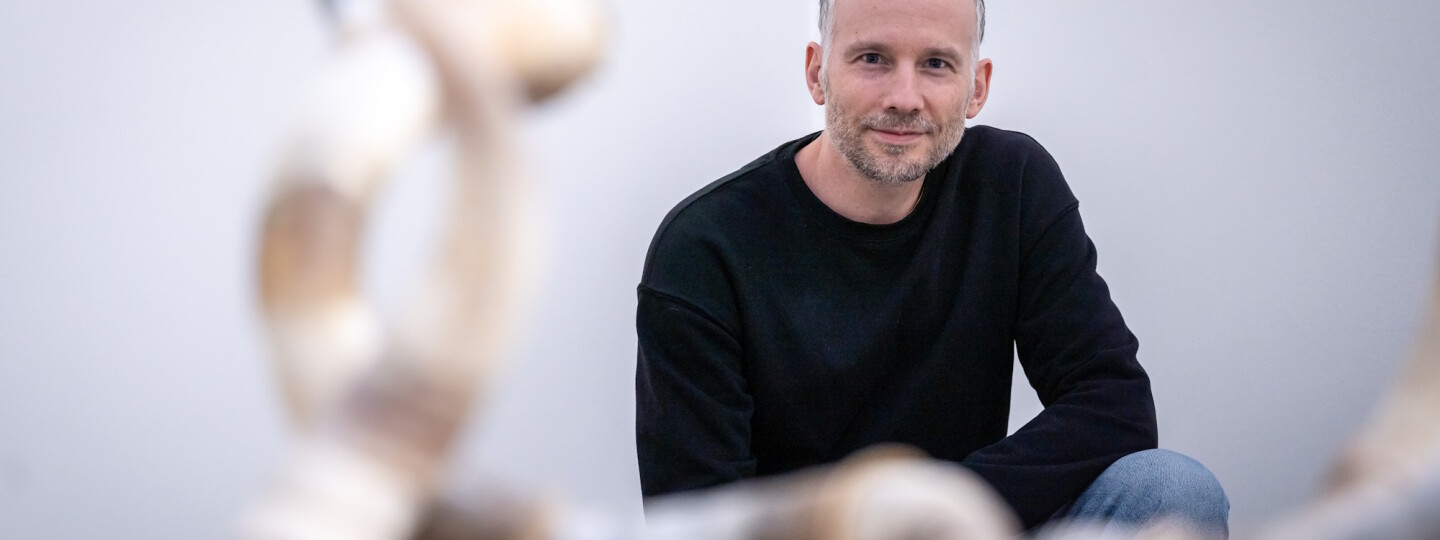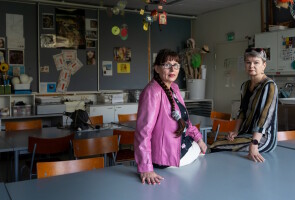Young Alexander Mildner wanted to be an artist. His parents did not object to the idea but suggested that their son should first go to the University of Göttingen, from where he could transfer to an art school after a year. But things turned out differently. Today, Mildner is one of the world's most cited immunology researchers and an Associate Professor at the InFLAMES flagship of the University of Turku.
Alexander "Alex" Mildner moved to Turku and the InFLAMES flagship in 2022 from Berlin, where he had his own research group at the Max Delbrück Center for Molecular Medicine. His impressive research career had already at that point placed him on the Highly Cited Researchers list, published annually by Clarivate in the United States.
“I don't do research for lists, I do it out of passion for science," notes Mildner.
Mildner decided to study biology during his gap year at the University of Göttingen. The young man, who was interested in nature, focused on microbiology and immunology in his studies.
“I was lucky to find my way into immunology. It was taught in the Faculty of Biology, and also in the Faculty of Medicine. Immunology was kind of in between two different disciplines, which was interesting.”
Gradually, the idea of making art began to fade.
“I had a very romantic idea about being an artist, I thought that a real artist has an inner compulsion to make art and cannot live without it. I didn't feel quite like that after all," recalls Mildner.
Mildner completed his master's degree in 2003 at the Max Planck Institute, where he studied the development of obesity in fruit flies. It was an interesting subject, but too far removed from the human condition for a researcher who had become interested in human diseases and the role of the immune system in them.
“I started working on my dissertation at the Department of Neuropathology, University Medical Center Göttingen, and began studying cells of the innate immune system, in particular macrophages. I have been hooked ever since!”
Macrophages, our friends since the dawn of time
Macrophages are white blood cells that protect the body from various pathogens such as viruses, bacteria, fungi, and parasites by eating them. In the same way, they also eat dying cells that are constantly being produced in our body. In fact, the meaning of the Greek word macrophage is the “large eater”.
"We try to find out how macrophages maintain the body's balance."
– Alexander Mildner
Macrophages are not unique to humans; all primitive organisms on land, in the air, and in the sea have macrophages. They have been present in the phenomenon called life longer than any other cell in the immune system. They developed hundreds of millions of years ago.
“In higher organisms like vertebrates, the immune system was then supplemented with cells of acquired or adaptive immunity, such as T and B cells. They are not found in worms, flies or octopuses. Non-vertebrates only rely on innate immunity, and they actually survive quite well with it,” explains Mildner.
Adaptive immune response develops through exposure to pathogens. When the body first comes into contact with a pathogen, it begins to produce immune cells and antibodies that recognise and destroy the pathogen. At the same time, an immune memory is created to ensure a rapid immune response in the event of reinfection.
Organs cannot function without macrophages
Mildner considers T and B cells to be the masterpieces of evolution, but he still has a love for macrophages.
“I believe that macrophages were developed for two reasons. First of all, they fight infections and secondly, they contribute to tissue structure and function. No organ can function without macrophages. The most exciting new area of our research at the moment is to find out how macrophages maintain the body's balance, or homeostasis.”
Macrophages are always there when the body is regenerating and growing. Unfortunately, a cancerous tumour that is able to hide from adaptive immune cells also appears as a growing new organ for the macrophages. Therefore, macrophages can also support tumour growth.
Similarly, macrophages contribute to the central nervous system (CNS) inflammation in multiple sclerosis (MS). Inflammation in the brain is caused by T-cells that somehow mistake the brain’s own tissue for foreign tissue. This is why the T cells then become activated and induce the CNS infiltrating macrophages to mount an immune response. This results in tissue damage and subsequently leads to neuronal cell death, the cause of paralysis in patients with MS.
"We are currently investigating how we can prevent macrophage activation in the CNS to stop tissue damage," says Mildner.
Fat clogs up the cellular machinery
MS and other autoimmune diseases are mistakes of the body that should not happen. Obesity and coronary heart disease are a different story. Mildner calls them non-physiological conditions to which the body tries to adapt to the best of its ability.
“Evolution did not foresee our bodies to be fat, but because the food supply has become excessive, we gain weight. When adipose tissue increases or cholesterol builds up in the coronary arteries, we also see an accumulation of macrophages in these organs.”
"Our research group is focusing on how we can help macrophages."
– Alexander Mildner
According to Mildner, macrophages in blood vessels try to restore balance by eating away excess fat. However, the situation is new to them, as evolution has not equipped them to function in a fatty environment, and so they fail. Macrophages eat what they can, but their machinery is suffocated by the abundance of fat.
“That is why our research group is now focusing on how we can help these macrophages. Our bodies have specialised macrophages that are programmed to live with fats. They are found, for instance, in the lungs. However, the answer is not simply to transfer these macrophages from one place to another in order to allow them to eat fat in the arteries, but to identify the factors behind the ability of some macrophages to process fat. This knowledge could lead to new drug discoveries.”
The research topics of Mildner’s research group are complex, but as a researcher he is inspired by simple, basic questions. The main one being "why is it happening?".
“Understanding why something is happening and what is behind the phenomenon is important for tackling not only immune system disorders, but diseases in general. This is something I also stress to my research group. Data and information never stand alone. Without context, the information is not informative,” notes Mildner.
Fascinated by the cold country
Mildner says he was attracted to the Nordic countries and that is why he was interested in the InFLAMES recruitment advertisement. During his visit to Turku, he liked what he saw at Turku Bioscience Centre, and the proximity of the hospital to the University campus was also inspiring. In addition to professional reasons, his desire to experience a country that is often described as dark and cold motivated him to come to Finland. He got used to a warmer climate while working as a Postdoctoral Researcher at the Weizmann Institute in Israel, but he wanted to also experience its counterpart, the cold climate.
The move north has brought many good things to his lifestyle.
“In Berlin, I spent an hour each way to commute to work. These days, I might even have time to pop into a café and read a newspaper for a while, which is a luxury for me.”
Mildner’s hobbies include hiking and in Finland he is interested in camping and foraging for mushrooms. He has already had the chance to try skiing in Lapland, and he hopes that the winter in Turku will also allow him the opportunity to do so.
Text: Liisa Koivula
Photos: Hanna Oksanen
Translation: Saara Yli-Kauhaluoma
InFLAMES Flagship is a joint initiative of University of Turku and Åbo Akademi University, Finland. The goal of the Flagship is to integrate the immunological and immunology-related research activities to develop and exploit new diagnostic and therapeutic tools for personalised medicine. InFLAMES is part of Research Council of Finland´s Flagship Programme.






